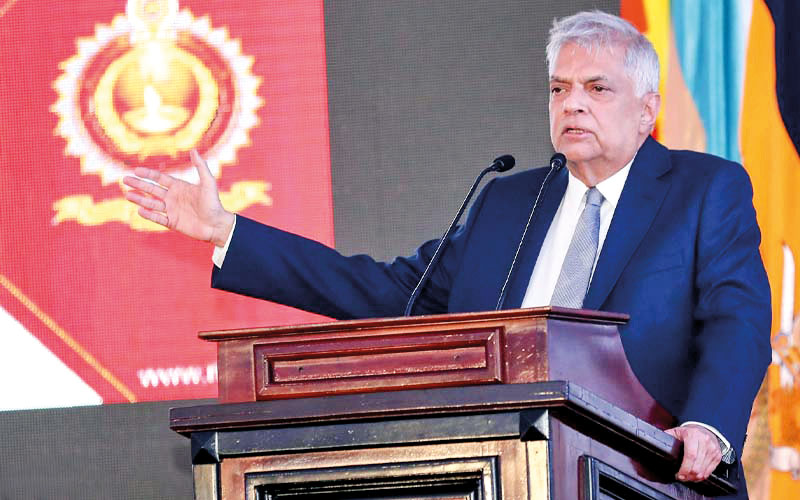Monday Feb 23, 2026
Monday Feb 23, 2026
Friday, 9 June 2023 02:08 - - {{hitsCtrl.values.hits}}

President Ranil Wickremesinghe
We are alarmed by the undemocratic measures pursued by President Ranil Wickremesinghe and his Government that continue to undermine the rule of law, fundamental rights and democracy in Sri Lanka. Of particular concern is the alarming trend of enacting and threatening to enact laws and regulations that in effect restrict fundamental rights and freedoms and legitimise the democratic backsliding and shrinking civic space.
These laws and regulations, mooted under the pretexts of economic recovery, stabilising the country and ensuring national security, have the potential to further suppress debate and dissent with deep consequences for our fragile democracy. We recognise and condemn this autocratic law reform agenda by an unelected president. ‘Rule by law’ is not Rule of Law, and must be called out for what it is, authoritarianism.
The Sri Lankan people are hard hit by a crisis that has been aggravated by bad governance. The President and his Government do not recognise the suffering of the people and also the unequivocal resistance of the people to governance that is divisive, favours the political elite and is detrimental to the interest of the people. The delay to hold elections has stripped the country of its democratic character.
We witnessed a host of measures deployed to stifle dissent. Within weeks of assuming the presidency, we witnessed an attempt to create a High Security Zone using the Official Secrets Act. The proposal was withdrawn in response to robust opposition at the abuse of an archaic law. The Rehabilitation Bureau Bill, introducing once again the narrative of and measures to ‘rehabilitate’ citizens, was proposed. The proposed law had no credible justification, no due process safeguards and failed to secure judicial scrutiny over executive action. The Bill was challenged in the Supreme Court, resulting in amendments introduced to address some of the potential for abuses of power.
Against a backdrop of calls to repeal the PTA, including the well-received Justice for All island-wide campaign in 2022, in March this year the Government introduced a draft Anti-Terrorism Act (ATA). The ATA amounts to a draconian proposal that provides broad powers to the police and security forces to arrest and detain individuals, place restrictions on media to publish and report, extensive power to the executive presidency to proscribe organisations, restrict movement, among other alarming provisions. If introduced, the ATA will be the latest tool by the authorities to crush any form of protest and dissent.
Media reports indicate the Government plans to introduce a law to establish a Broadcasting Regulatory Commission with broad powers to decide on licenses for media organisations. This is the most recent tool in the playbook to restrict media freedom with alarming consequence for freedom expression in Sri Lanka.
In the name of economic reforms, changes to the social protection scheme of the country is taking place without wide consultation amongst those most affected. Reforms to labour laws have also been floated in a context of heightened citizen uncertainty relating to rising cost of living, unemployment, food security and increased care burden on women.
Justice for All recognises a context of increased surveillance, intimidation and harassment of journalists, protesters and others critical of the Government and Government sanctioned actions by law enforcement authorities and the military. Violent measures of tear gassing and water cannons in response to peaceful protests became the norm prompting the Human Rights Commission of Sri Lanka to respond with guidelines to the police on protecting fundamental rights of protestors.
We condemn the continued use of the International Covenant on Civil and Political Rights Act (ICCPR Act) by the authorities to suppress free speech and protest. The latest use of this Act is to arrest and detain a stand-up comedian for making a satirical remark alleged to be offensive to Buddhism, and the subsequent arrest of a blogger for sharing that video clip. This law meant to safeguard civil and political rights has since its enactment only been used as a weapon against those who are critical or have an alternative view point and is publicised in a way that installs a divisive racially charged narrative in the Sri Lankan polity.
Moreover, we express deep concern over the intimidatory and inciting language used by the President and some of his cabinet colleagues when referring to critics and political opponents. The labelling of those who have an alternative view point as conspirators effectively undermine the importance of constructive criticism and hinder the growth of a healthy democracy.
Furthermore, this insidious rhetoric actively fuels animosity towards those who sincerely raise their grievances in public, advocate for the strengthening of democracy, advocate for policies that serve the people, the upholding of the rule of law, and stand against corruption and the pervasive culture of impunity.
We recognise for its destructive value the measures taken by the President and his Government. We note that the consequences of these actions will have a lasting impact on the fabric of our society and shape the lives of the generations to come. The language of economic recovery and national security used to undermine the demands of the people must be resisted. We take this moment to recognise the path our country is on. We reaffirm to ourselves and all those who care for the people of this country that it takes courage and vision to engage in open dialogue, listen to the concerns of the people and genuinely value debate and dissent. A truly democratic society thrives when citizens are given the space to express their views, critique policies, and actively participate in shaping the future of their country.
1. A.A.M. Faaiz
2. Bhavani Fonseka
3. Ermiza Tegal
4. Jayadeva Uyangoda
5. Jayampathy Wickramaratne
6. M.A. Sumanthiran